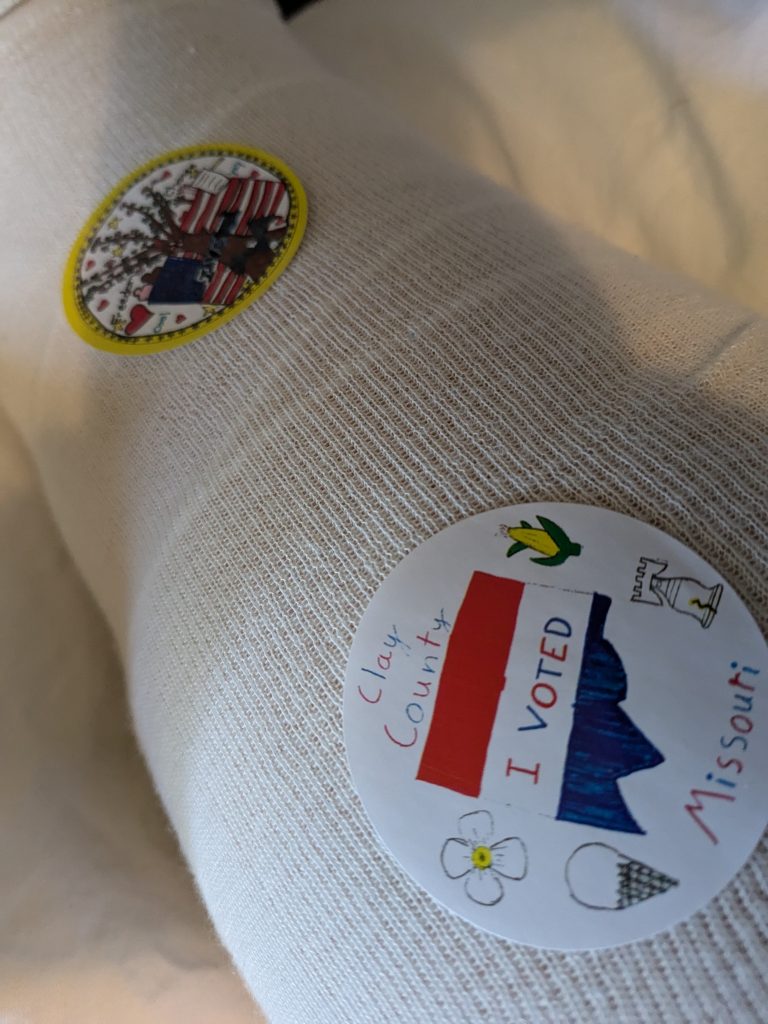By Amanda Lubinski
ALubinski@cherryroad.com
Millions of voters cast their ballots in the Tuesday, Nov. 5 general election in Missouri, making their voices heard on abortion rights, minimum wage, sports betting, law enforcement pension funding and more.
Throughout early voting and on Election Day, election authorities reported long lines and large numbers of ballots being cast across the state.
In Clay County, election board judges predicted a nearly 80% voter turnout. Based on uncertified results from the Clay County Election Board, more than 71% of the county’s 184,175 voters cast ballots in the general election.
According to county election judge Heather Hall, on the first day of no-excuse early voting, more than 3,400 ballots were cast. By Monday, Nov. 4, nearly 61,000 early votes were cast.
“We have had a steady line here at our office,” said Hall before election night.
Amendment 2
Based on uncertified results from the Secretary of State’s Office, Amendment 2, legalizing sports betting in the state, narrowly passed with 1,469,866 votes, or 50.13%, in favor compared to 1,462,380, or 49.26%, votes against.
The amendment calls for a 10% sales tax on all collected gambling revenue to be directed toward funding education and the compulsive gambling fund.
A start date will be no later than Dec. 1.
Amendment 3
Voters also overturned the abortion ban, enshrining the right to reproductive freedom by saying “yes” on Amendment 3.
Amendment 3 recognizes a “fundamental right to reproductive freedom,” which the ballot measure language defines as the right to make decisions “about all matters relating to reproductive health care, including but not limited to prenatal care, childbirth, postpartum care, birth control, abortion care, miscarriage care and respectful birthing conditions.”
The measure now prohibits the General Assembly from banning abortion until fetal viability, defined in the measure as the point in pregnancy when there’s a significant chance the fetus can survive outside the womb without extraordinary medical measures.
According to the Kansas City Star, Missouri is now the first state in the country where voters ended an abortion ban since the fall of Roe vs. Wade.
“Anti-abortion politicians in our state raced to make Missouri the first state in the country to enact a total ban after the Dobbs decision,” the Star reported Emily Wales, the president and CEO of Planned Parenthood Great Plains Votes, saying to supporters at a watch party in Kansas City Tuesday. “Now they get to watch as we take back our rights and become the first state to end a total abortion ban after Dobbs.”
While the amendment takes effect in early December, abortion likely won’t immediately be accessible across the state, according to The Missouri Independent.
Leaders with Missourians for Constitutional Freedom said many of the state’s existing TRAP laws, which made access nearly impossible prior to the abortion ban, will first need to be challenged in court.
“And they expect a hard-fought path to regaining abortion access,” reports the state news site.
Amendment 5
Another close vote count came on Amendment 5, which failed with with nearly 53% of votes cast, or 1,510,697 total votes, against the measure compared to 48%, or 1,104,920, votes in favor.
The failure means the way for a casino near the Bagnell Dam at Lake of the Ozarks has not been cleared.
Amendment 6
Missouri voters also said “no” to instilling court fees to support law enforcement pensions like those for elected sheriffs and county prosecutors.
According to the Secretary of State’s uncertified election night results, nearly 61% of voters, or 1,697,649 votes of the 2,802,569 cast, said “no” to the measure.
The issue was put to voters by the General Assembly, which sought to reverse the impact of a 2021 Missouri Supreme Court ruling that found these fees unconstitutional.
The amendment proposed changing the Missouri Constitution to allow the legislature to fund benefits for the state’s 114 elected county sheriffs or their surviving spouses by collecting a $3 fee per case where a guilty verdict or plea is reached.
Retirement benefits for prosecutors were to be supported through a $4 fee.
Amendment 7
Voters in Missouri passed Amendment 7, with more than 68% of the 2,851,546 votes cast in favor. Passage bans ranked-choice voting in the state with the exception of St. Louis.
Rank-choice voting is where voters rank their preferred candidates in order of preference instead of choosing only one candidate to win.
Under the amendment, Missouri elections will remain as is, with the candidate who receives the most votes winning.
Prop A
The state’s minimum wage will increase and employees will see mandatory paid seek leave being offered as voters in Missouri said “yes” to Proposition A on election night.
According to uncertified vote totals, Prop A passed with about 58% of the 2,918,605 votes cast in favor.
With passage, minimum wage will go up to $13.75 an hour in 2025, then to $15 an hour in 2026 and will be adjusted each year after that based on inflation.
The new law, which takes effect Jan. 1, will also require employers with at least 15 employees to provide one hour of paid sick leave for every 30 hours worked.




